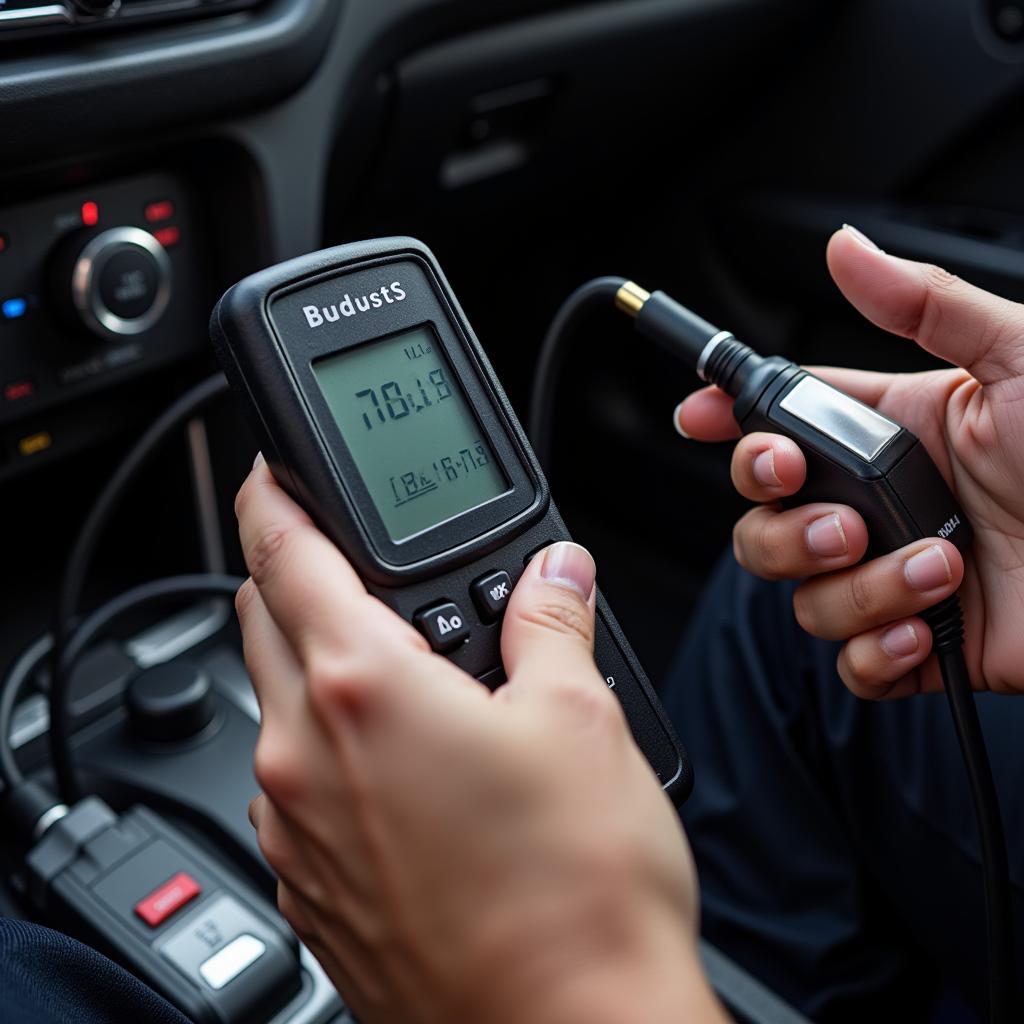The summer heat is upon us, and nothing is worse than a car AC system that’s blowing hot air. A malfunctioning AC system isn’t just uncomfortable, it can also be a sign of more serious issues lurking under the hood. Luckily, a Car Ac Diagnostic Tool can be your best friend in troubleshooting and fixing these problems before they turn into major headaches (and repair bills!).
 Car AC Diagnostic Tool In Action
Car AC Diagnostic Tool In Action
Why You Need a Car AC Diagnostic Tool
Gone are the days of relying solely on gauges and guesswork to diagnose car AC problems. Modern vehicles have complex electronic systems, and the AC is no exception. A car AC diagnostic tool offers a window into these systems, allowing you to:
- Read and clear fault codes: These codes, stored in your car’s computer, pinpoint specific areas within the AC system that are malfunctioning.
- View live data streams: Monitor parameters like refrigerant pressure, compressor operation, and temperature readings in real-time to understand how your AC system is performing.
- Run component tests: Activate specific AC components, like the compressor or blower motor, to pinpoint the source of a problem.
 Mechanic Checking AC Pressure
Mechanic Checking AC Pressure
Choosing the Right Car AC Diagnostic Tool
The market is flooded with car AC diagnostic tools, from basic code readers to advanced professional-grade scanners. When choosing a tool, consider:
- Your budget: Entry-level tools can be found for under $100, while professional-grade options can cost several hundred dollars.
- Your skill level: If you’re a DIYer, a basic tool with code reading and live data capabilities might be sufficient. Professionals need more advanced features like bi-directional control and component testing.
- Vehicle compatibility: Ensure the tool you choose is compatible with the make, model, and year of your vehicle, especially if you own an older car.
Common Car AC Problems a Diagnostic Tool Can Help With
- Low refrigerant levels: One of the most common AC issues, often indicated by warm air blowing from the vents. A diagnostic tool can confirm low refrigerant and help pinpoint potential leaks.
- Faulty compressor: The heart of your AC system, a failing compressor can prevent the refrigerant from circulating properly. A diagnostic tool can check compressor operation and identify issues.
- Electrical problems: Malfunctioning sensors, relays, or wiring can disrupt the AC system’s operation. A diagnostic tool can read fault codes and live data to pinpoint electrical faults.
- Blower motor issues: If the blower motor fails or is not receiving power, you won’t feel any air coming from the vents. A diagnostic tool can test the blower motor and its electrical circuits.
 Fault Codes on Car AC Diagnostic Tool
Fault Codes on Car AC Diagnostic Tool
Expert Insight
“Investing in a quality car AC diagnostic tool is a game-changer for any DIYer or professional mechanic,” says John Smith, a seasoned automotive technician with over 20 years of experience. “It takes the guesswork out of diagnosing AC problems, saves you time and money, and gives you the confidence to tackle repairs effectively.”
Conclusion
A properly functioning AC system is essential for a comfortable and enjoyable driving experience, especially during the scorching summer months. A car AC diagnostic tool empowers you to take control of your car’s cooling system, allowing you to diagnose problems accurately and efficiently. Whether you’re a seasoned mechanic or a DIY enthusiast, a good diagnostic tool is an investment that pays for itself in no time.
FAQs
1. Can I use a generic OBD-II scanner for car AC diagnostics?
While some generic OBD-II scanners can read basic engine codes, they may not be equipped to access the specific modules and data related to the AC system. For comprehensive car AC diagnostics, a dedicated car AC diagnostic tool or a more advanced scan tool is recommended.
2. Are car AC diagnostic tools difficult to use?
Most car AC diagnostic tools are user-friendly, featuring intuitive interfaces and clear instructions. However, some familiarity with basic automotive terminology and concepts is beneficial. Numerous online resources and tutorials are available to guide users.
3. Can I fix my car AC myself using a diagnostic tool?
A diagnostic tool can help you identify the root cause of the problem, but the complexity of the repair varies. Simple fixes, like recharging refrigerant, can be done with basic tools and some mechanical knowledge. However, more complex issues involving electrical components or compressor replacement are best left to professionals.
4. How often should I check my car AC system?
It’s generally recommended to have your car AC system inspected annually, ideally before the start of the summer season. This allows for early detection of potential issues and ensures optimal performance when you need it the most.
5. Can a car AC diagnostic tool be used on other vehicle systems?
Some car AC diagnostic tools are dedicated solely to AC systems, while others offer broader functionality. Advanced scan tools can access multiple vehicle systems, including engine, transmission, ABS, airbags, and more. Consider your diagnostic needs and budget when choosing a tool.
Need Help With Your Car AC?
If you’re experiencing car AC issues or have any questions, our team of expert technicians is here to help. Contact us via WhatsApp: +1(641)206-8880, or email us at [email protected] for 24/7 support and expert advice.
Don’t let a faulty AC ruin your summer drives. Check out our other articles on car ac diagnostic tools and multi-manufacturer car diagnostic tool for more information and guidance on keeping your car cool and comfortable.

Leave a Reply